Department "Information communication technologies"
- 2855 views
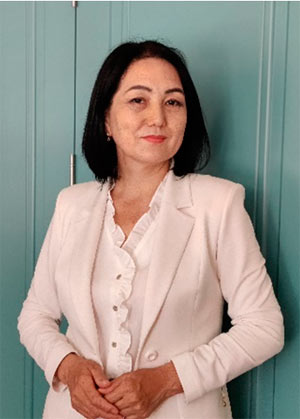
Botaeva Saule Baizakovna
candidate of technical sciences, docent
✆ Phone: 87072560496
✉ E-mail: k-akparat@tashenev.edu.kz
- About the department
-
Brief historical information about the department
The Department of Information and Communication Technologies has been operating since the first day of the university’s foundation in 2022. The teaching staff of the department carries out educational activities in the following undergraduate educational programs 6B06101 – “Computer technology and software”, 6B06102 – “Information systems” and 6B06112 – “Informatics”.
The department employs 1 professor, Doctor of Pedagogical Sciences; 4 associate professors, candidates of sciences; 1 Doctor of Philosophy PhD, senior lecturer; 3 Masters of Science, senior teachers, 4 Masters of Science, teachers, as well as 3 part-time candidates of science and 4 specialists with industrial experience. - Teaching staff
-
1. Educational Goals:
• To ensure high-quality education for students through modern educational programs in the field of information technology.
• To develop practical skills in students necessary for addressing current challenges in IT and management.
2. Research Activities:
• Active participation in scientific research and development aimed at solving problems in information systems and technologies.
• Collaboration with industrial partners to implement joint projects and innovations.
3. Innovations in the Educational Process:
• Implementation of modern educational technologies and interactive teaching methods, such as project-based learning and case studies.
• Development of new courses that consider current trends in IT, such as artificial intelligence, big data, and cloud technologies.
4. Professional Development of Faculty:
• Organization of regular training sessions and seminars to enhance the qualifications of the teaching staff.
• Encouragement of faculty participation in international conferences and scientific publications.
5. Development of International Cooperation:
• Establishment of partnerships with foreign universities for experience exchange and joint educational programs.
• Involvement of foreign experts to conduct lectures and master classes.
6. Student Participation in Scientific and Professional Life:
• Encouragement of students to participate in scientific research, conferences, and competitions.
• Creation of conditions for the development of startups and projects that facilitate practical application of knowledge.
7. Career Opportunities:
• Establishment of connections with employers to organize internships, work placements, and job opportunities for students.
• Conducting job fairs and career days with the participation of partner companies.
This strategy aims to create a dynamic and competitive educational environment that fosters the training of highly qualified specialists in the field of information technology.
The department employs a professor, doctor of science; associate professors, candidates of science; 1 candidate of science, senior lecturers; doctor of philosophy PhD, senior lecturer; masters of science, senior lecturers, as well as part-time workers, including 1 PhD and 2 specialists with industrial experience:
- Educational programs
-
The department trains specialists in the educational programs: 6B06101 – "Computer Engineering and Software," 6B06102 – "Information Systems," 6B06112 – "Computer Science," and 6B06103 – "Management Information Systems."
The key feature of these programs is the integration of scientific and methodological literature, allowing students to explore current research and innovations in information technology. The programs emphasize the development of foreign language skills, aligning with international education standards and preparing specialists to work effectively in global environments.
Additionally, students have the opportunity to study international educational experiences, fostering critical thinking and practical skills. This enriches their knowledge and helps develop the organizational and management vision needed for a successful career in information systems and computer engineering. As a result, graduates possess the necessary competencies and are prepared to solve complex challenges in modern conditions.
The educational program 6B06101 – "Computer Engineering and Software" aims to prepare qualified specialists with in-depth knowledge in software development, implementation, and support, as well as in computing technologies.
Students study modern programming languages, algorithms, computer system architecture, and software design methodologies. Special attention is given to practical skills, including participation in real projects and development of software solutions for various industries.
The program also includes familiarization with international standards in information technology, enabling graduates to compete successfully in the job market. Furthermore, the focus on foreign language skills equips future specialists to work effectively in international settings and collaborate with overseas colleagues. As a result, graduates become not only technically proficient but also capable of critical thinking and innovative approaches to solving complex problems.
The educational program 6B06102 – "Information Systems" is designed to train specialists capable of developing, implementing, and managing information systems across various fields. The program covers key aspects of information systems design, analysis, optimization, as well as data and process management within organizations.
Students study modern technologies and tools for information processing, including databases, programming, systems analysis, and project management. Special emphasis is placed on practical skills, enabling graduates to effectively address tasks related to business process automation and information security.
The primary goal of the 6B06112 – "Computer Science" program is to prepare specialists capable of effectively utilizing and advancing information technologies across various fields. The program aims to build a strong foundation in both theoretical and practical aspects of computer science, allowing students to successfully address tasks related to process automation, data processing, and software development.
Particular attention is given to the integration of modern methods and technologies, as well as the acquisition of practical experience in working with information systems. Students become acquainted with the fundamentals of designing, analyzing, and optimizing information processes, which prepares them for real challenges in their professional activities.
An important aspect of the program is the development of critical thinking and creativity, allowing graduates not only to adapt to the rapidly changing market conditions but also to introduce innovations in their work. There is also an emphasis on studying foreign literature and international standards, which helps to form competitive specialists ready to work in a global environment.
The educational program 6B06103 – "Management Information Systems" teaches students the basics of designing, developing, and implementing information systems intended to support management in various organizations. The program focuses on the combination of theoretical knowledge and practical skills necessary for the effective use of information technology in management.
- Methodical work
-
The master class on the topic "Education of the Future: Application of Artificial Intelligence and Neural Networks in the Educational Process" was successfully completed.
Speaker: Saduakas Arystan, teacher of the Department of Information and Communication Technologies, Master of International Relations.
Master class plan:
1. Introduction to Artificial Intelligence
What is Artificial Intelligence?
2. The Role of AI in Education: Automation of Everyday Tasks
• Personalization of the Educational Process.
• Improving the Quality of Education with the Help of Intelligent Data Analysis Systems.
3. Important AI Tools for Teachers.During the master class, the speaker spoke in detail about the concept of artificial intelligence and its importance in the modern educational process. He presented practical examples of using AI to automate routine tasks, allowing teachers to focus on more important aspects of learning.
The speaker also emphasized how personalizing the learning process with AI can significantly increase student motivation and improve their academic performance. Participants learned about various tools and resources available to teachers that help implement AI technologies in their daily practice.
The master class sparked a lively discussion, and participants actively asked questions, sharing their experiences and ideas on how AI can be used to improve educational processes in their institutions.
- Social and educational activities
-
Students of the IT department take an active part in all republican, city and university events.
On September 23, 2024, members of the Senate and Mazhilis of the Parliament of the Republic of Kazakhstan held a meeting with young professionals and active youth at the University named after Zh. A. Tashenov. During the event, they discussed the key issues outlined in the Address of the Head of State.Our active students took part in a concert dedicated to Teachers' Day. This event was a wonderful opportunity to express gratitude to teachers for their work and dedication to teaching. The students prepared a variety of numbers, including musical performances and dances, which created a warm and festive atmosphere. The concert attracted a large number of spectators, and all those present ere pleased with the impressive performances and the atmosphere of unity and respect for teachers.
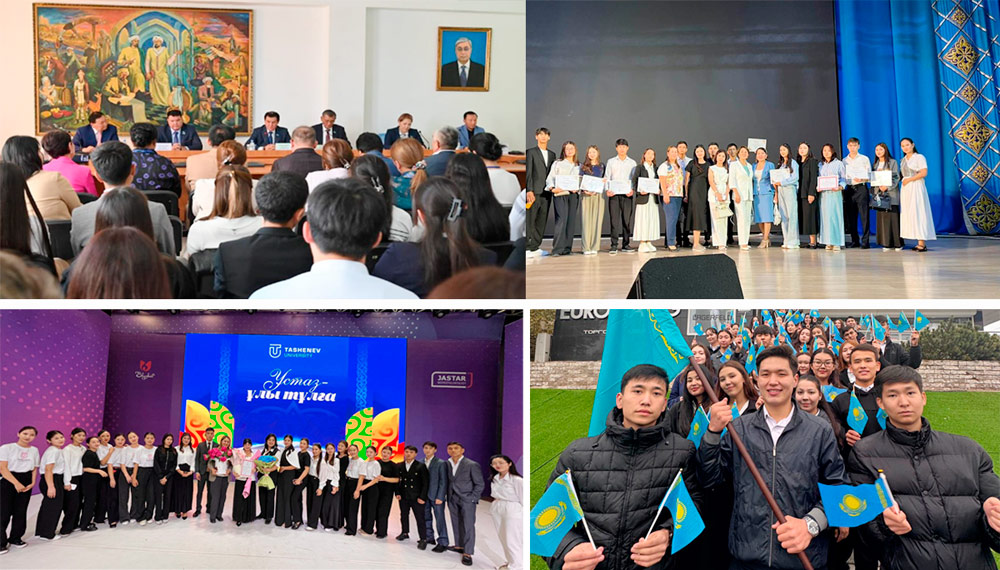
Active students of our university took part in the event dedicated to the Constitution Day. During the event, they got acquainted with the basic principles and importance of the Constitution for the development of the country. The students also prepared speeches, which included theatrical performances and presentations emphasizing the importance of the rights and freedoms of citizens. The atmosphere was filled with the spirit of patriotism and respect for the laws of the state, which contributed to strengthening the civic position of young people. The event brought together many participants and became an excellent opportunity to discuss current issues related to the rights and responsibilities of citizens.
- Scientific direction of the department
-
Information about scientific articles of the department:
№
Topic of the article
Place of publication
Authors
Number of pages
Type of article (thesis, article, report)
Journals with Impact Factor
Use Of The Naive Bayes Classifier Algorithm In Machine Learning For Student Performance Prediction
International Journal of Information and Education Technology,
Vol. 14, No. 1, 2024
Venera Nakhipova, Yerzhan Kerimbekov, Zhanat Umarova, Laura Suleimenova, Saule Botayeva, Almira Ibashova, and Nurlybek Zhumatayev.
7
article
The Impact Of “Scratch” On Student Engagement
And Academic Performance In Primary Schools
Open Education Studies 2024; Vol.6: 20220228
Venera Nakhipova, Damira Belessova, Almira Ibashova, Aziza Zhidebayeva, Guldana Shaimerdenova
10
article
Applying Computer Vision And Machine Learning Techniques In Stem-Education Self-Study
IJACSA) International Journal of Advanced Computer Science and Applications, Vol. 15, No. 1, 2024
Venera Nakhipova,
Rustam Abdrakhmanov, Assyl Tuimebayev, Botagoz Zhussipbek, Kalmurat Utebayev
9
article
A Novel 2d Deep Convolutional Neural Network For Multimodal Document Categorization
(IJACSA) International Journal of Advanced Computer Science and Applications Vol. 14, No. 7, 2023
Venera Nakhipova,
Rustam Abkrakhmanov, Aruzhan Elubaeva, Tursinbay Turymbetov
9
article
Publications in republican journals (ZhAK):
Expanding the capabilities of development environments through the use of plugins
South Kazakhstan Science Herald № 3(23)2023
Kenzhebaeva U.E., Tarasova R.N., Baimusaeva A.B.
4
article
Conducting a selection of IDE and code editors when developing web applications
South Kazakhstan Science Herald № 3(23)2023
Kenzhebaeva U.E., Nuranova D.N., Izkhanova B.E.
4
article
Modern BACKEND frameworks for web development
South Kazakhstan Science Herald № 3(23)2023
Botaeva S.B., Bakberdieva K.M., Kenzhebaeva U.E.
4
article
Mobile programming languages
South Kazakhstan Science Herald № 2(26)2024
Khamzina A.M., Kenzhebaeva U.E.
article
Application and management databases
South Kazakhstan Science Herald № 2(26)2024
Manatay A.Zh. , Kenzhebaeva U.E.
4
article
Artificial intelligence capabilities and their impact on organizational creativity and efficiency
Tashenov Zh.A. Science Herald
Kenzhebaeva U.E. Rakhmetullakyzy A., Bakberdieva K.M.
4
article
Printed circuit board design and 3D modeling as a result of the integration of AUTODESK and CADENCE
Tashenov Zh.A. Science Herald
Kenzhebaeva U.E. Borankulov B.A., Saduakas A.N.
4
article
Choosing between native and cross-platform programming environments for mobile applications
Tashenov Zh.A. Science Herald
Kenzhebaeva U.E., Bakberdieva K.M., Borankulov B.A.
4
article
Mathematical base of artificial intelligence
Tashenov Zh.A. Science Herald
Nyshanbaeva Zh.U., Kenzhebaeva U.E.
4
article
Choosing between native and cross-platform programming environments for mobile applications
South Kazakhstan Science Herald
Kenzhebaeva U.E., Bakberdieva K.M., Borankulov B.A.
4
article
Virtual reality and its development prospects
South Kazakhstan Science Herald
Kenzhebaeva U.E., Zhantoreeva Meruert Kenzhebaeva U.E., Saduakas A.N., Rakhmetullakyzy A.
4
article
Prospects for the development of technologies in web programming
South Kazakhstan Science Herald
Kenzhebaeva U.E. Borankulov B.A., Saduakas A.N.
4
article
Methods For Using Machine Learning Tools To Develop A Learning Assessment Platform: A Comprehensive Study
Tashenov Zh.A. Science Herald
Venera Nakhipova,
Yerzhan Kerimbekov,
Zhanat, Umarova,
Laura Suleimenova, Botakoz Izkhanova
12
article
Application Of Machine Learning In Education
Tashenov Zh.A. Science Herald
V.I. Nakhipova, E.R. Kerimbeko, L.A. Suleymenova, B.E. Izkhanova
12
article
Publications At International Conferences In The Countries Of Far And Near Abroad:
EDM Methods For Predicting The Academic Performance Of University Students Based On Regression Analysis
Proceedings of the 4th International Scientific
Conference «Progress in Science» (November 9-10, 2023). Brussels, Belgium
Nakhipova Venera, Suleimenova Laura,
ismailov Bakhtiyar,
Zhakypbekova Gulnar,
Zhaidakbayeva Lyazzat,
Seisenbek Markhabat
13
article
- Practice bases
-
Since bachelors of educational programs carry out their professional activities in the field of education, the bases for professional practice are institutions of general and technical, as well as vocational education. Students undergo industrial practice at the end of each year after completing theoretical training in accordance with the working curriculum. The duration of the practice is determined by the number of weeks based on 30 hours of the student's standard work week.
Schedule of industrial practice by courses:
• 1st year: 2 credits, 2nd semester, 2 weeks.
• 2nd year: 4 credits, 4th semester, 3 weeks.
• 3rd year: 6 credits, 6th semester, 4 weeks.
• 4th year: 8 credits, 8th semester, 8 weeks.
The internship supervisor is fully responsible for the preparation, implementation, organizational and control activities of the internship. Before the internship, the student receives a diary from the supervisor with methodological instructions for completing the tasks of the internship program and the topic of the individual assignment. During the internship, the student completes assignments corresponding to the topic and tasks associated with the workplace. The internship is conducted in the structural divisions of the university, schools, advanced enterprises and institutions using information systems and technologies. The main partners of the Department of Information and Communication Technologies, with whom agreements have been concluded, include:
1. TOO "Balance Service"
2. TOO "Corporation Eurasian New Construction Technologies"
3. IP "Innovative Educational Center"
4. IP "ANN GLOBAL"
5. TOO "Nur-com-tel"
6. TOO "SMART HUB"
7. TOO "INFORMATION TECHNOLOGIES INVEST GROUP"
8. KGU "Zhetysay District Club of National Sports"
9. GU "Apparatus of the Akim of the Yntymak Rural District"
10. GU "Apparatus of the Akim of the Karakay Rural District"
11. GKKP Zhetysay Humanitarian and Technical College named after Muratbaeva
12. State Institution "Apparatus of the Akim of the Kazykbek Rural District"
In the period of the 2023-2024 academic year, information was provided on the distribution of practice bases and the number of students who completed industrial and educational practice in the specified institutions.
- Advanced training
-
On May 27, 2024, our university completed a unique course on artificial intelligence for teachers. The goal of the course was not only to introduce teachers to modern AI technologies and tools, but also to teach them how to effectively apply this knowledge in the educational process.
Presentation Defenses
The course culminated with presentations on the topic “How Will I Use Artificial Intelligence in the Teaching Process?”. Teachers presented their projects, shared new discoveries, and explained how the implementation of AI has changed their approach to teaching.
Presentation Topics and Ideas
The presentations covered a wide range of topics, including:
• Personalized Learning: Using AI to tailor learning materials to the needs of each student.
• Educational Data Analytics: Using machine learning technologies to analyze student performance and predict student achievement.
• Automation of Administrative Tasks: Using chatbots and other AI tools to automate schedules, FAQs, and other routine tasks.
• Interactive Learning Materials: Creating interactive courses and labs with AI for a more engaging and effective learning experience.
Participant Feedback
Teachers rated the course highly, noting its practical focus and relevance. Here are some of their reviews:
• “The course helped me understand how AI can improve the educational process and make it personalized for each student.”
• “I can now effectively use data to make informed decisions in teaching.”
• “AI not only makes routine tasks easier, but also opens up new opportunities for interactive and engaging learning.”Our university continues to implement modern technologies in the educational process, keeping up with the times. We are proud of our teachers who strive for professional growth and improvement of innovative approaches to teaching students.


- Career guidance work
-
Career guidance work at the department is focused on attracting applicants and supporting graduates in employment issues, which contributes to the development of students' professional self-determination.
The department actively participates in open days and specialized fairs for employers from schools and colleges, organizes its own open days, as well as off-site events in various regions and cities. These events allow students to be reached in both urban and rural areas.
The main goal of career guidance work is to inform applicants about the areas and specialties offered by the university, as well as about employment opportunities and additional professional training. The best approach to the career guidance program of a university involves not only attracting new students and supporting graduates, but also paying attention to the intermediate stage - professional development and self-determination of students during the learning process.
Regular monitoring of trends in the labor market helps the university better understand the needs of employers and correlate them with the competencies of graduates. This allows the university to establish effective interaction with industry employers and companies, thereby increasing the chances of graduates finding employment in their specialty.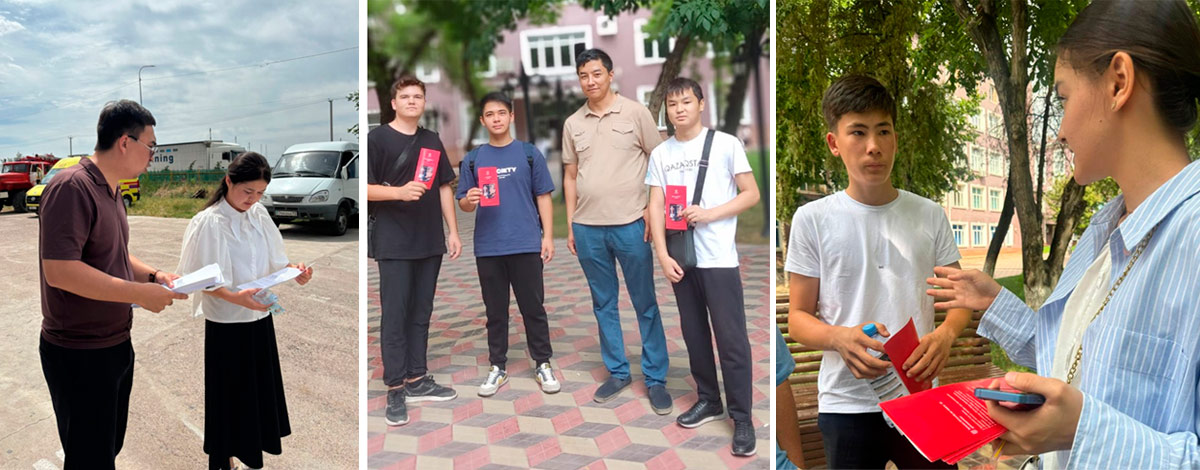

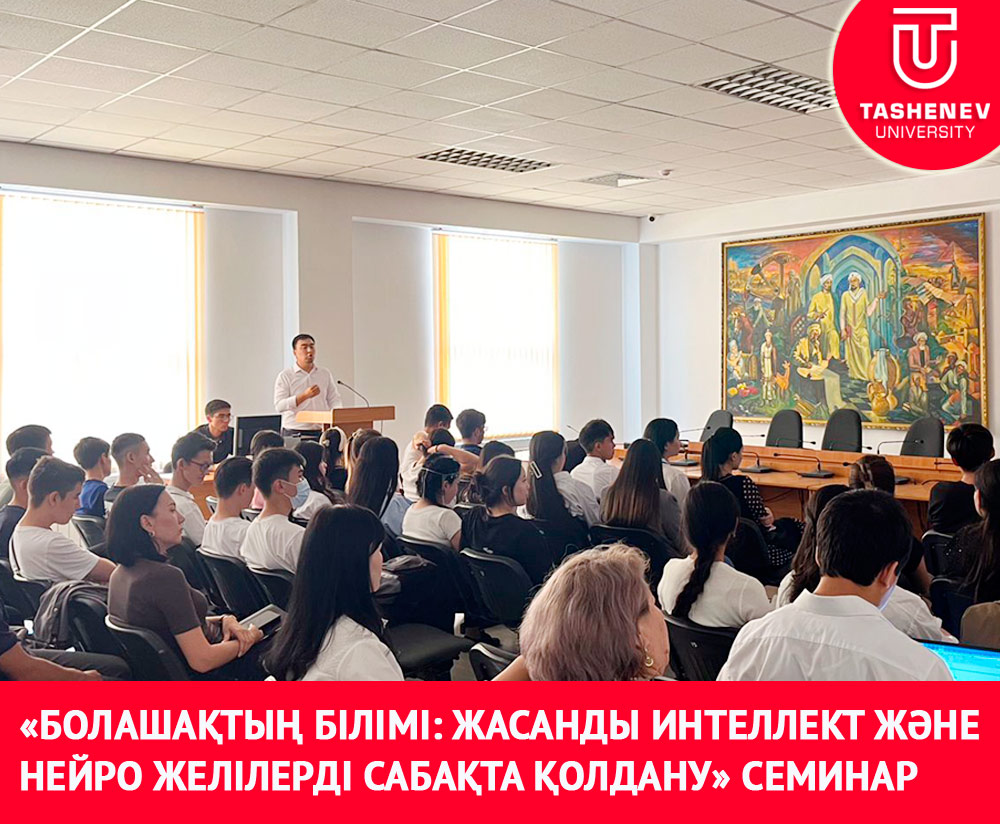
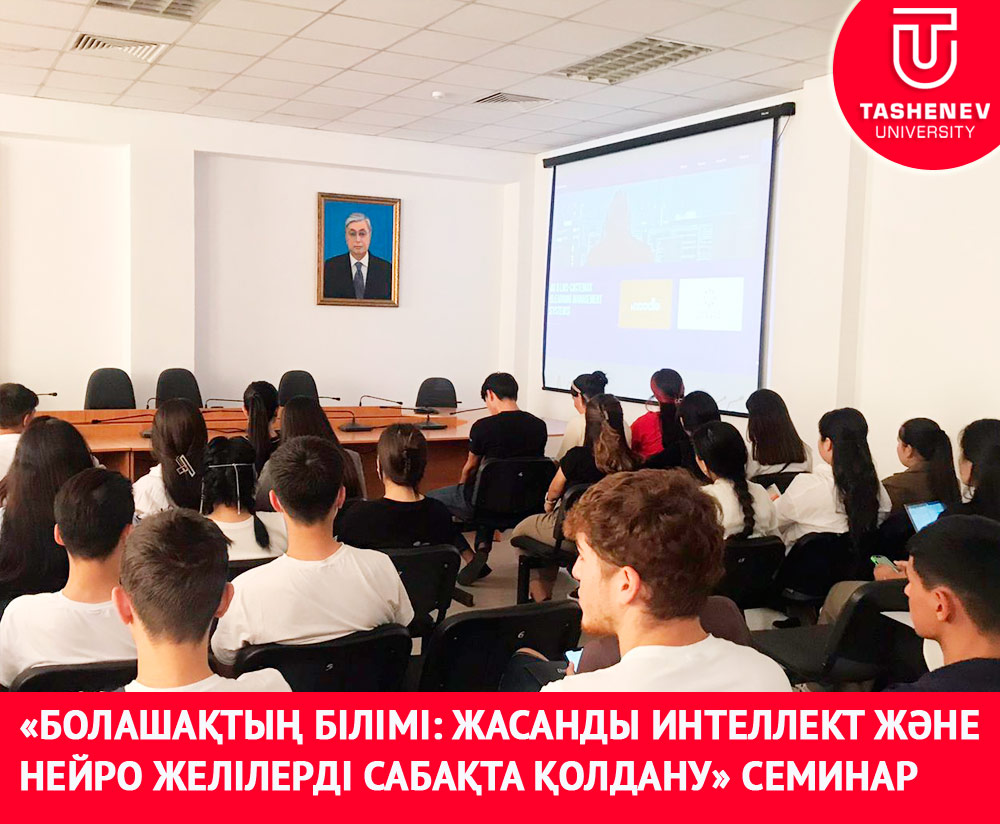
Add new comment